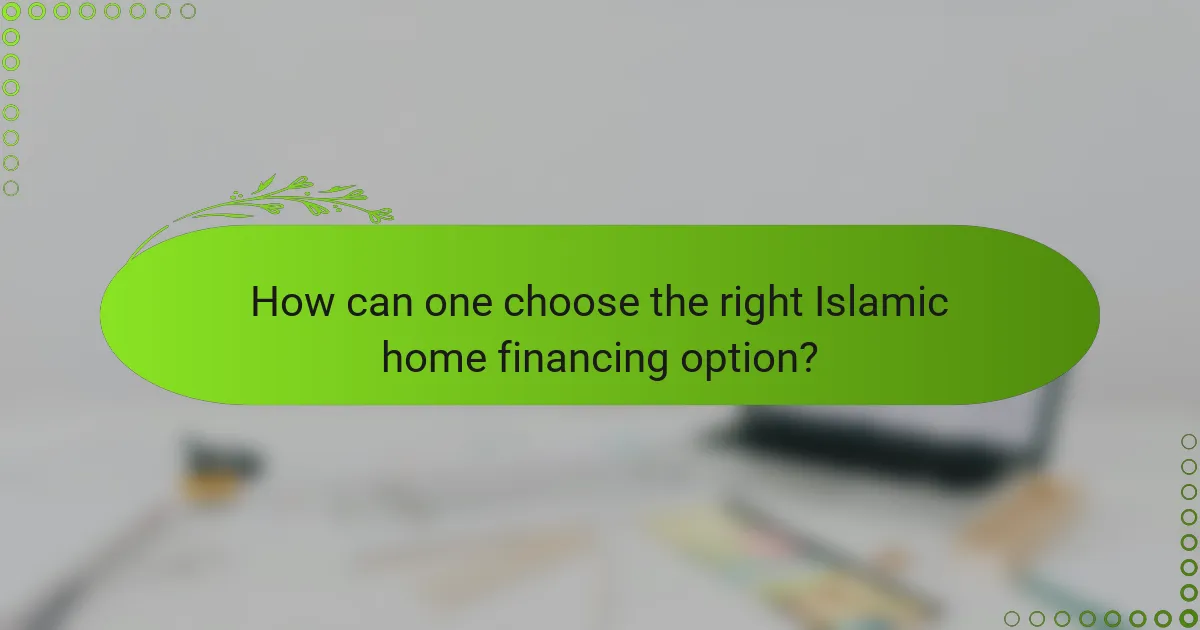
What are Islamic home financing options?
Islamic home financing options include Murabaha, Ijara, and Musharaka. Murabaha involves the bank purchasing the property and selling it to the buyer at a profit margin. Ijara is a leasing agreement where the bank buys the property and leases it to the buyer, who may purchase it later. Musharaka is a partnership where both the bank and the buyer co-own the property, and the buyer gradually buys out the bank’s share. These options comply with Sharia law, which prohibits interest. They provide ethical alternatives for home financing while ensuring that the financial transactions are fair and transparent.
How do Islamic home financing options differ from conventional financing?
Islamic home financing options differ from conventional financing primarily in their adherence to Sharia law. Conventional financing typically involves interest-based loans, which are prohibited in [censured]. Instead, Islamic financing uses profit-sharing and leasing arrangements. For example, in a Murabaha contract, the lender buys the property and sells it to the borrower at a markup. This method ensures that no interest is charged. Another option is Ijara, where the bank purchases the property and rents it to the borrower. The borrower eventually owns the property after all payments are made. These structures promote ethical investment and risk-sharing, aligning with Islamic principles.
What principles underlie Islamic home financing options?
Islamic home financing options are based on principles that comply with Sharia law. These principles include the prohibition of riba, or interest, which is considered exploitative. Instead, Islamic financing promotes profit-sharing and risk-sharing arrangements. Murabaha, a common method, involves the lender purchasing a property and selling it to the borrower at a markup. Ijara is another method, where the lender buys the asset and leases it to the borrower. These structures ensure ethical investment and financial transactions. They also promote social justice by avoiding excessive risk and uncertainty, known as gharar. Islamic financing aims to foster community welfare and economic stability.
What are the key characteristics of Islamic financing?
Islamic financing is characterized by adherence to Sharia law principles. It prohibits interest (riba), ensuring that financial transactions are based on real economic activity. Risk-sharing is fundamental, meaning both lender and borrower share the risks and rewards of investments. Transactions must involve tangible assets or services, avoiding speculation (gharar). Islamic financing promotes ethical investments, aligning with moral and social values. Profit and loss sharing arrangements, such as Mudarabah and Musharakah, are commonly used. Additionally, it emphasizes transparency and fairness in agreements, protecting the rights of all parties involved. These characteristics differentiate Islamic financing from conventional financial systems.
What benefits do Islamic home financing options provide?
Islamic home financing options provide ethical financial solutions that comply with Sharia law. They promote risk-sharing between the lender and borrower. This reduces the financial burden on the borrower. Islamic financing avoids interest (riba), which is prohibited in [censured]. Instead, it uses profit-sharing or leasing arrangements. These methods can lead to more equitable financial transactions. Additionally, Islamic financing encourages ownership and investment in property. This aligns with Islamic principles of community welfare and social responsibility.
How do Islamic financing options promote ethical investing?
Islamic financing options promote ethical investing by adhering to principles that prohibit interest and unethical activities. These options are based on Sharia law, which emphasizes fairness and social justice. Investments must align with ethical standards, avoiding sectors like alcohol, gambling, and pork. This ensures that funds support socially responsible projects. For example, Islamic banks often invest in real estate and infrastructure that benefit communities. Additionally, profit-sharing models like Mudarabah and Musharakah foster equitable risk distribution. This approach encourages transparency and accountability in financial transactions. Thus, Islamic financing inherently supports ethical investment practices.
What financial advantages can borrowers expect from Islamic home financing?
Borrowers can expect several financial advantages from Islamic home financing. One key advantage is the absence of interest payments, which aligns with Islamic law prohibiting riba (usury). This can lead to lower overall costs for borrowers compared to conventional loans with interest.
Another advantage is profit-sharing arrangements, where borrowers and lenders share the risks and rewards of the investment. This can create a more equitable financial relationship. Islamic financing often includes fixed payment structures, providing borrowers with predictable monthly expenses.
Additionally, Islamic home financing may offer longer repayment terms, allowing for more manageable payments. Some institutions provide financing without requiring private mortgage insurance (PMI), which can reduce monthly costs.
Furthermore, Islamic home financing can promote financial discipline, as it encourages saving and responsible spending. Overall, these factors contribute to a potentially more sustainable financial experience for borrowers.

What eligibility criteria are required for Islamic home financing?
The eligibility criteria for Islamic home financing include a steady income, creditworthiness, and compliance with Sharia law. Applicants must demonstrate a reliable source of income to ensure they can meet repayment obligations. Creditworthiness is assessed through a review of the applicant’s financial history. Additionally, the property being financed must adhere to Islamic principles, meaning it cannot involve prohibited activities such as gambling or alcohol. Some institutions may also require a minimum down payment, often around 20% of the property value. Lastly, applicants may need to provide documentation such as proof of employment and income statements.
Who can apply for Islamic home financing options?
Individuals who adhere to Islamic principles can apply for Islamic home financing options. This includes Muslims who seek financing that complies with Sharia law. Eligibility typically extends to those with a stable income and good credit history. Institutions offering these options often require proof of income and employment. Applicants must also demonstrate the ability to repay the financing. Some institutions may have specific age or residency requirements. Overall, the primary criterion is adherence to Islamic financial principles.
What income requirements must be met for eligibility?
Eligibility for Islamic home financing typically requires a stable income that meets specific thresholds. Applicants must demonstrate a consistent income source to ensure repayment capability. Generally, the income should be sufficient to cover monthly financing payments and living expenses. Many institutions require a debt-to-income ratio not exceeding 40%. This ratio ensures that borrowers do not overextend their financial commitments. Additionally, some lenders may set minimum income levels based on local cost of living. Proof of income may include pay stubs, tax returns, or bank statements. These requirements help assess the applicant’s financial stability and ability to meet obligations.
Are there specific residency or citizenship requirements?
Yes, there are specific residency or citizenship requirements for Islamic home financing options. Typically, lenders require borrowers to be citizens or legal residents of the country where the financing is offered. This ensures that the financing adheres to local laws and regulations. Additionally, proof of residency may be required to verify the borrower’s eligibility. Requirements can vary by lender and jurisdiction, so it is essential to consult specific institutions for detailed criteria.
What documentation is necessary to apply for Islamic home financing?
To apply for Islamic home financing, specific documentation is required. Applicants typically need proof of identity, such as a government-issued ID or passport. Employment verification documents, including recent pay stubs and a letter from the employer, are also necessary. Financial statements, including bank statements and tax returns, help assess the applicant’s financial situation. Additionally, property-related documents like the sale agreement or property title are essential. Some institutions may require a credit report to evaluate creditworthiness. Each financial institution may have unique requirements, so it is advisable to check with them directly for any additional documentation needed.
What financial documents are typically required?
Financial documents typically required for Islamic home financing include proof of income, tax returns, and bank statements. Proof of income verifies the borrower’s earnings. Tax returns provide insight into financial stability. Bank statements show savings and spending habits. Additionally, a credit report may be required to assess creditworthiness. Property documents are also necessary to confirm ownership and value. These documents ensure compliance with Islamic financing principles and facilitate the approval process.
How does credit history impact eligibility for Islamic financing?
Credit history significantly impacts eligibility for Islamic financing. Islamic financing institutions often assess credit history to determine a borrower’s reliability. A positive credit history indicates responsible financial behavior. This can lead to better financing terms and approval rates. Conversely, a poor credit history may result in rejection or higher costs. Islamic financing adheres to Shariah principles, which emphasize ethical lending practices. Institutions aim to minimize risk, making credit history a crucial factor in their evaluation process.

How can one choose the right Islamic home financing option?
To choose the right Islamic home financing option, one should first understand the principles of Sharia-compliant financing. These principles prohibit interest (riba) and emphasize ethical investment. Next, evaluate various financing models such as Murabaha, Ijara, or Musharaka. Each model has distinct features and suitability for different financial situations. Assess personal financial circumstances, including income, expenses, and creditworthiness. Compare the terms and conditions of different providers, focusing on transparency and fees. Research customer reviews and experiences with financial institutions. Consulting with a knowledgeable advisor can also provide valuable insights. This structured approach ensures informed decision-making in selecting the appropriate Islamic home financing option.
What factors should be considered when selecting an Islamic financing provider?
Factors to consider when selecting an Islamic financing provider include compliance with Shariah principles. The provider must ensure that their financing products avoid interest (riba) and unethical investments. Transparency in fees and terms is crucial for trust and understanding. Evaluating the provider’s reputation and experience in Islamic finance is essential. Customer service quality should also be assessed for ongoing support. Additionally, the range of financing options available can impact the decision. Lastly, the provider’s adherence to regulatory standards can indicate reliability and stability in the market.
How do different providers vary in their financing structures?
Different providers vary in their financing structures by employing distinct models aligned with Islamic principles. Some providers use profit-sharing models, such as Musharakah, where both the bank and the borrower share ownership of the property. Others may utilize leasing agreements like Ijarah, where the bank purchases the property and leases it to the borrower. Each provider’s structure reflects their interpretation of Sharia law and the risk-sharing principles involved. For instance, some may require a higher equity contribution from borrowers, while others offer lower initial payments. Variations also exist in terms of fees, profit rates, and the duration of financing. These differences can significantly impact the overall cost and accessibility of financing options for consumers.
What questions should borrowers ask potential lenders?
Borrowers should ask potential lenders about the specific terms of the financing. Key questions include: What is the profit rate? Are there any fees associated with the loan? What is the repayment schedule? Is there a penalty for early repayment? What are the eligibility criteria for this financing? Are there options for refinancing in the future? Can you provide a detailed breakdown of the total cost of the loan? Understanding these factors ensures borrowers make informed decisions regarding Islamic home financing options.
What are some common pitfalls to avoid in Islamic home financing?
Common pitfalls to avoid in Islamic home financing include misunderstanding the principles of Sharia-compliant contracts. Many individuals confuse Islamic financing with conventional loans. This leads to engaging in transactions that may involve interest, which is prohibited in [censured]. Another pitfall is overlooking the importance of transparency in fees and charges. Hidden fees can lead to unexpected financial burdens. Additionally, failing to read and understand the contract terms can result in unfavorable conditions. It’s crucial to ensure that the financing structure aligns with Islamic principles, such as profit-sharing rather than interest-based lending. Lastly, not consulting with knowledgeable advisors can lead to poor decision-making. Seeking guidance from experts can help navigate the complexities of Islamic financing.
How can borrowers ensure compliance with Islamic principles?
Borrowers can ensure compliance with Islamic principles by adhering to the prohibition of riba, or interest. They should seek financing options that are structured on profit-sharing or leasing models. Islamic financing must involve tangible assets and avoid speculative transactions. Borrowers should engage with certified Islamic financial institutions to ensure adherence to Shariah law. It’s essential to review contracts for compliance with Islamic ethics. Consulting with a knowledgeable scholar can provide additional guidance. Following these steps helps borrowers align their financial activities with Islamic teachings.
What mistakes should be avoided during the application process?
Common mistakes to avoid during the application process include incomplete documentation. Applicants should ensure all required documents are submitted. Missing documents can delay approval or result in rejection. Another mistake is not understanding the eligibility criteria. Familiarity with these criteria is crucial for a successful application. Additionally, applicants should avoid providing inaccurate information. Misleading details can lead to disqualification. Not seeking guidance from financial advisors is also a mistake. Professional advice can clarify complex terms and conditions. Lastly, ignoring the terms of the financing agreement is unwise. Understanding these terms helps prevent future financial issues.
What tips can help streamline the process of obtaining Islamic home financing?
To streamline the process of obtaining Islamic home financing, start by gathering all necessary documentation. This includes proof of income, credit history, and identification. Research various Islamic financing options available in your region. Understanding the principles of Sharia-compliant financing is crucial. It is essential to compare different providers and their terms. Engaging with a financial advisor specializing in Islamic finance can provide valuable insights. Prepare a clear budget and determine how much financing you need. Timely communication with your chosen lender can expedite the approval process. Finally, ensure you understand all terms and conditions before signing any agreements.
Islamic home financing options refer to various Sharia-compliant financial products such as Murabaha, Ijara, and Musharaka, designed to provide ethical alternatives to conventional financing. These options prohibit interest (riba) and promote risk-sharing, ensuring fair and transparent transactions. The article outlines the principles underlying Islamic financing, the benefits it offers borrowers, and the eligibility criteria required for applicants, including income stability and compliance with Islamic laws. Additionally, it addresses key characteristics of Islamic financing, common pitfalls to avoid, and tips for streamlining the application process.